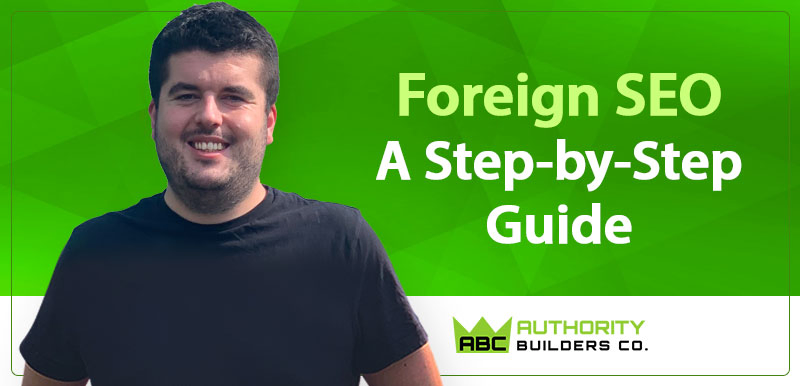
Having been working as an SEO for around ten years, last year I decided to take on a slightly different challenge from my usual affiliate sites and venture into the world of foreign SEO.
Despite not speaking a second language, I managed to create a foreign-language, high buyer intent supplement site using an aged domain, and take it from 0 to 37k monthly visitors in nine months.
Here is the Google Search Console screenshot for the past 30 days:
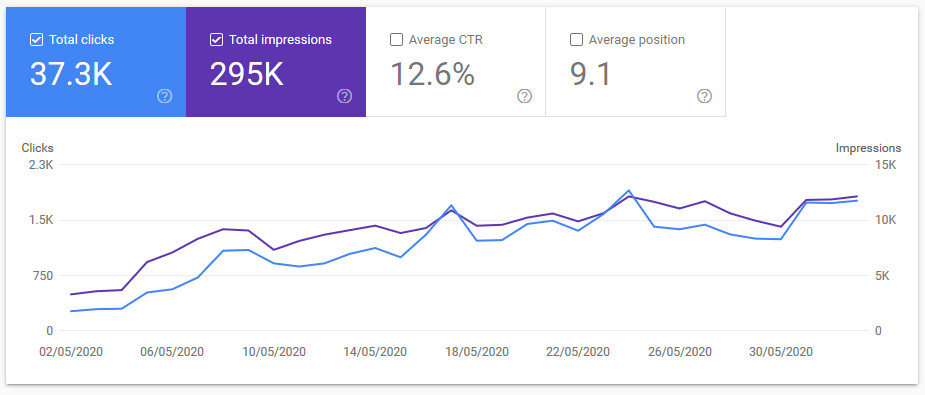
So now I’m going to share with you how I did it.
In this article, I’m going to discuss the challenges that arise specifically in foreign SEO, and how you can overcome them. You’ll learn the process of starting a foreign language affiliate website, from niche selection to link building.
Why Choose Foreign SEO?
If you have ever researched foreign SEO, it sounds too good to be true.
The competition is lower, it requires less investment and it’s like travelling back in time to 2014, when SEO was “easy” and PBN’s were king.
So, what’s stopping you from getting started?
Well, lots of things. For example, if you don’t speak the language fluently, how do you go about:
- Keyword research
- Website optimisation
- Building backlinks
- Ensuring content quality
- Anchor text selection
- Managing a team in a foreign language
- Etc.
It’s a minefield.
The question is, is it worth finding solutions for these complications?
Here are some examples of sites killing it in foreign SERPs, which might convince you it is:
Polish CBD ecommerce Website
This CBD ecommerce website is ranking in Poland for tonnes of buyer intent keywords:

How can a website with a DR of just 7 rank so well in a niche as competitive as CBD? Well, here is a screenshot of the SERPs for one of the 7,700 search volume keywords it is ranking for:
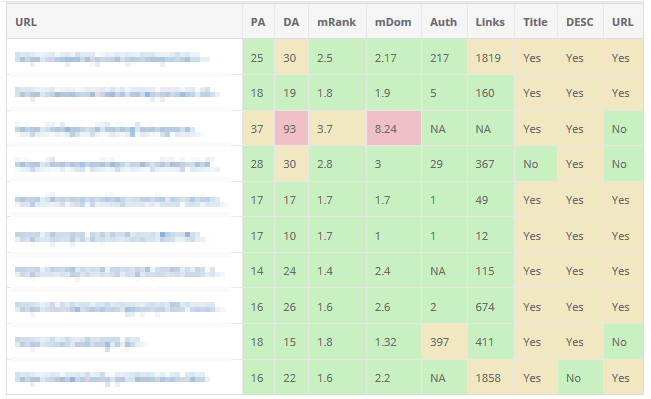
For the same keyword phrase in US searches, the results are far more competitive, and it could take you years to build up enough authority to compete with them. In comparison, in Poland you can compete in months after building a few Polish links.
Spanish Mattress Affiliate Website
This mattress review website is also ranking for some high buyer intent keywords:

Here is a screenshot of the SERPs for one of the 6,800 search volume keywords it’s ranking for with a relatively small amount of Spanish link building:
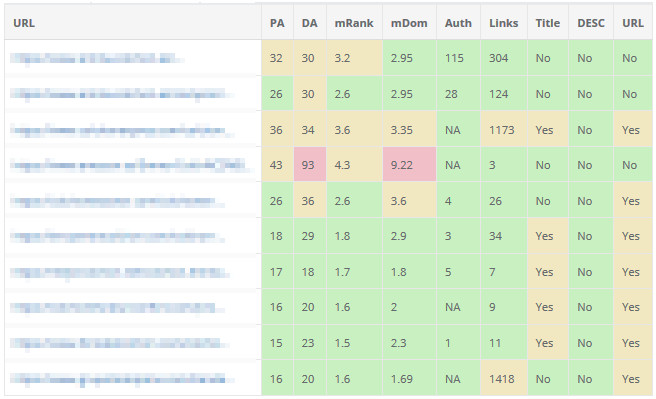
I didn’t have to look particularly hard to find these examples; there are a lot of wide-open foreign niches you can get into. I will discuss how I found these types of keywords in the next section.
How Can You Get Started?
You will face different hurdles than you do in English-speaking SEO.
First, you need to begin with an opportunity analysis to decide if the cost of building out the site and systems can be offset by the potential returns. How to go about this is straightforward.
Choosing A Niche
When it comes to choosing foreign affiliate programs, I recommend using Offer Vault. You can filter by country and category to find affiliate programs that are available in your target location.
If you already have an English-speaking affiliate website that is converting well and you have a good understanding of the niche, cost per visitor etc., I recommend starting with this niche for your first foreign site.
I took the above approach for my first foreign affiliate site – I have a similar supplement site that I run with my business partner, and I was able to transfer the research from that website across.
This will save you time and money because you will already have a deep understanding of the niche, affiliate networks, approach and what the article structure should look like.
Once you’ve found an affiliate offer that you’re happy with, you have a starting point for your keyword research.
This has a few more steps than you’ll normally use…
Determining Buyer Intent Keywords
Finding the right buyer-intent keywords remains the most important element of foreign SEO, but you also need to consider local variations in terminology.
This is because buyer intent phrases change from country to country and translation applications may miss the subtle nuances of the language.
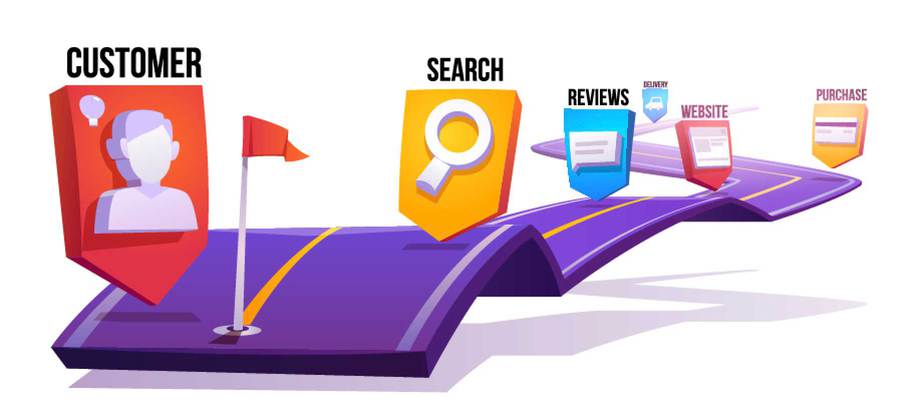
For example, if you translate the keyword ‘best hair trimmer’ into German, you get ‘bester Haarschneider’, which has a monthly search volume of just 400.
Strange right? Are hair trimmers not popular in Germany? Of course they are, they just don’t often use the word ‘bester’ when looking for round up reviews.
They use the word ‘test’.
The keyword they would typically type in is ‘haarschneider test’ – the monthly search volume for this keyword is 6300.
Not understanding these key phrases may cause you to miss the mark on a good niche.
To utilise this and find suitable buyer intent keywords, translate the parent keyword into your target language using Google translate:
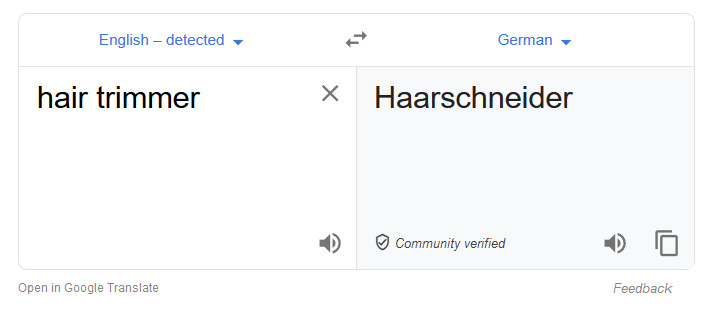
Put that result into Ahrefs’ keyword research tool. Then open the Google Chrome translation feature:
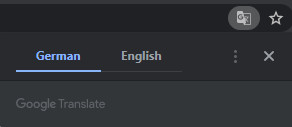
This helps you to easily switch between English and your chosen language, to see which buyer intent keywords you should target:
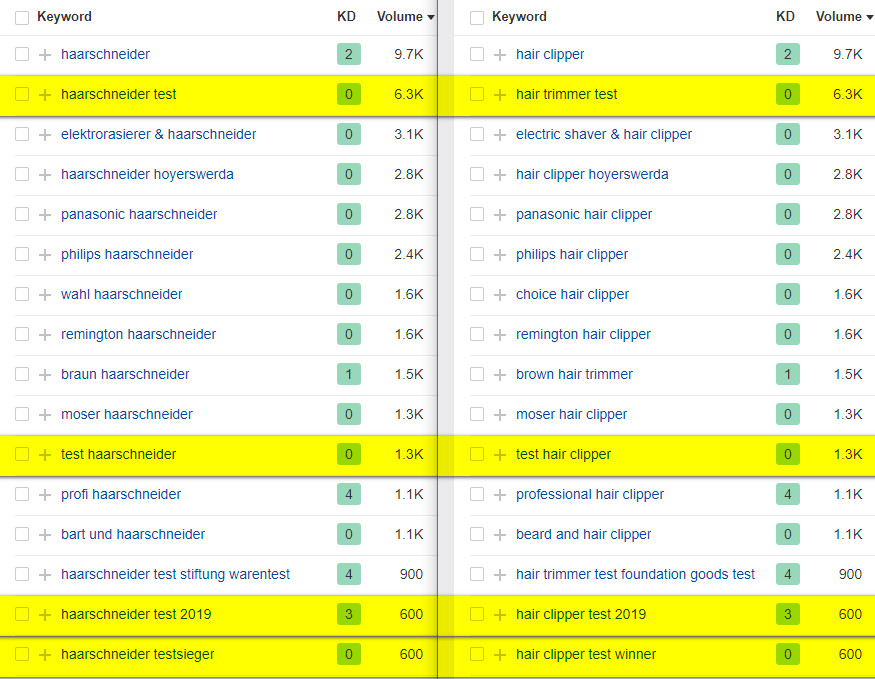
You can take a similar approach for single product review type keywords. Once you’ve found an affiliate offer you are interested in promoting, type it into Ahrefs and select your target country.
Here is an example of a popular dating affiliate offer called, ‘xflirt’, targeting French searches:d
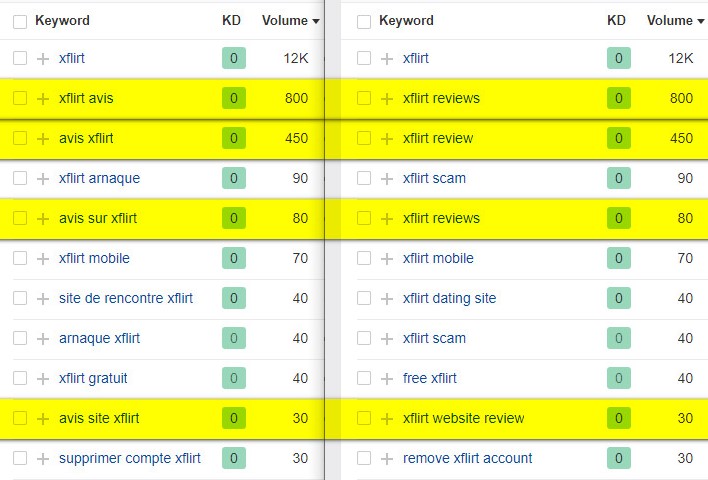
As you can see, ‘avis’ translates to review.
It takes some playing around to get used to it, but Ahrefs is a huge help with this, especially if you’re using a translation extension where you can easily switch between English and your target language.
To make it easier, below are some of the buyer intent keywords for several European countries, along with their population size, internet users and GDP:
| Country | ‘Review’ – Foreign Equivalent | ‘Best’ – Foreign Equivalent | Population | Internet Users | GDP US$million |
|---|---|---|---|---|---|
| Germany | erfahrungen | Test or testsieger | 82.1 million | 84% | 3,996,759 |
| France | avis | meilleur | 65 million | 81% | 2,707,074 |
| Italy | recensioni or opinioni | miglior or migliori | 59.4 million | 61% | 1,988,636 |
| Spain | opiniones | mejor | 46.4 million | 85% | 1,397,870 |
| Poland | opinie | ranking or najlepsza | 38.2 million | 76% | 565,854 |
| Romania | pareri | cea mai buna or cele mai bune | 19.7 million | 64% | 243,698 |
| Netherlands | ervaringen | beste | 17 million | 93% | 913,658 |
| Greece | κριτικες | ο καλυτερος or η καλυτερη | 11.2 million | 70% | 214,012 |
| Czech Republic | recenze | nejlepší | 10.6 million | 79% | 245,226 |
| Portugal | opiniões | melhor | 10.3 million | 74% | 237,979 |
| Sweden | recension | Test or bästa | 9.9 million | 96% | 535,607 |
| Hungary | vélemények | legjobb or teszt | 9.7 million | 77% | 139,761 |
| Denmark | anmeldelser | test or bedste | 5.7 million | 97% | 352,058 |
| Finland | arvostelu | Paras, hyvä or testivoittaja | 5.5 million | 87% | 252,246 |
| Norway | anmeldelse | Test or beste | 5.3 million | 97% | 399,470 |
| Cell | Cell | Cell | Source | Source | Source |
Once you’ve found a niche you’re happy with, reverse engineer the top performing websites. For example, one of the sites ranking (with only a DR of 4.2) for ‘xflirt’ in France, also promotes these other offers:
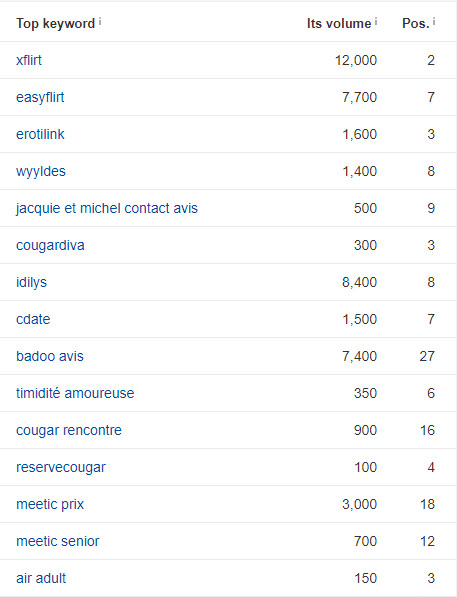
After repeating this several times, you should be able to plan out your content strategy.
Choosing Your Domain
Before you choose a domain, include in your niche research whether a local domain extension is likely a ranking factor.
This is quick and easy to do – just analyse the SERPs for a few of your target keywords. Is it mainly .es extensions, or is it a mix of .es, .org and .com?
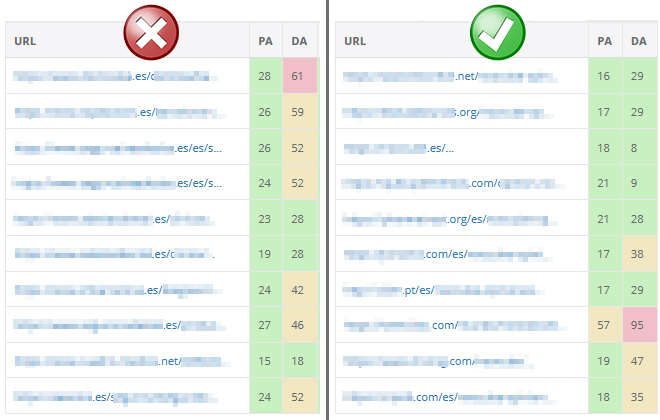
Some countries place restrictions on who can own a website with their local extension. For example, .it domains are restricted to companies and individuals within the EU. You can see a full list of TLDs, including the restrictions, here.
If you want to register a restricted local domain extension, you can advertise on a local CraigsList-type service to find someone who is willing to register it with their details, but you will need a contract ensuring you are ultimately responsible for any legal issues that may arise with the website.
My recent projects all use aged domains because of the reduced sandbox time, backlink profile, age and authority.
For better results in foreign SEO, use an aged domain that previously had a presence in the country you are targeting.
You can find aged domains on domain auctions, or you can buy them through a broker. I used TB Solutions for my foreign-language supplement website. Both domain auction scraping tools and brokers allow you to filter domains by language.
You can give a little more direction to Google by selecting the country you are targeting in Search Console:
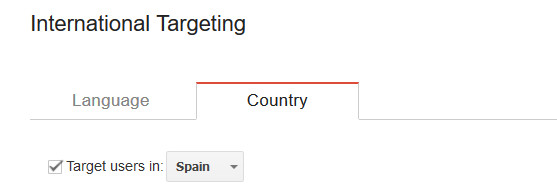
Hiring Excellent Writers
Finding a writer is more challenging because it’s harder to determine the quality of their writing. This is why pre-screening is very important.
It is critical that the writers also speak fluent English, so that they understand your systems and you can easily communicate with them.
You likely already have your own systems for hiring writers and ensuring high attention to detail, but for foreign websites, you’ll need to put a greater emphasis on pre-screening.
Initially, you can request examples of similar assignments and assess them by translating them into English, using Microsoft Word. While this won’t give you an idea of the quality of the grammar, it will show you how they structure their content and whether they follow the basic principles you require.
If they have a good education and lots of positive feedback, their grammar is likely to be good, but if you want more reassurance, you can set them a small task and then ask a native proofreader to assess it. We hire proofreaders from Upwork.
On-Site SEO
If you don’t speak the language you are targeting, your writer will have to take on more SEO responsibilities than they normally would. Therefore, it is important that you have clear instructions and SOPs that they can follow.

Your SOP requirements will mostly be the same as your English sites. Ours include:
- How to research competitors
- Structuring the article/page layout
- How to use Surfer SEO
- Finding outbound links and relevant sources
- How to write the CTA
- NLP guidance
- For riskier niches, guidelines on how to stay compliant with local legislation
Content Creation
When creating a brief for a writer, you should include the following:
- The type of article they are writing. Is it a single product review, ‘best’ round-up page or supporting content?
- Examples
- The main target keyword (xflirt avis)
- Links to the top 3 competitors
- Product sales pages
- Word count
For content optimization, the Google docs Surfer SEO chrome extension helps your writer naturally add the keywords into the content.
Metas And Title Tags
In addition to the optimization of the content, initially the meta and title tags will have to fall on your writer’s plate.
But even if they have no experience in SEO, with the right training, this should be relatively easy for your writer to take on.
You can prepare the list of keywords, prioritise them in order, then either give them your own instructions or refer them to the ‘Title Meta’ section of Matt Diggity’s Onsite SEO Guide.
Uploading The Content To Your Site
If you intend to upload the content yourself, you can translate the document in Word to help you lay out the page and choose the appropriate media yourself.
Or, if you are handing it over to an uploader, you can get your writer to choose images and prepare the article for uploading.
You just need to ensure that your SOPs include plenty of guidance on choosing images and selecting alt tags, as well as specific requirements for linking, selecting anchor text for authority links and optimising calls to action.
Here is an example:
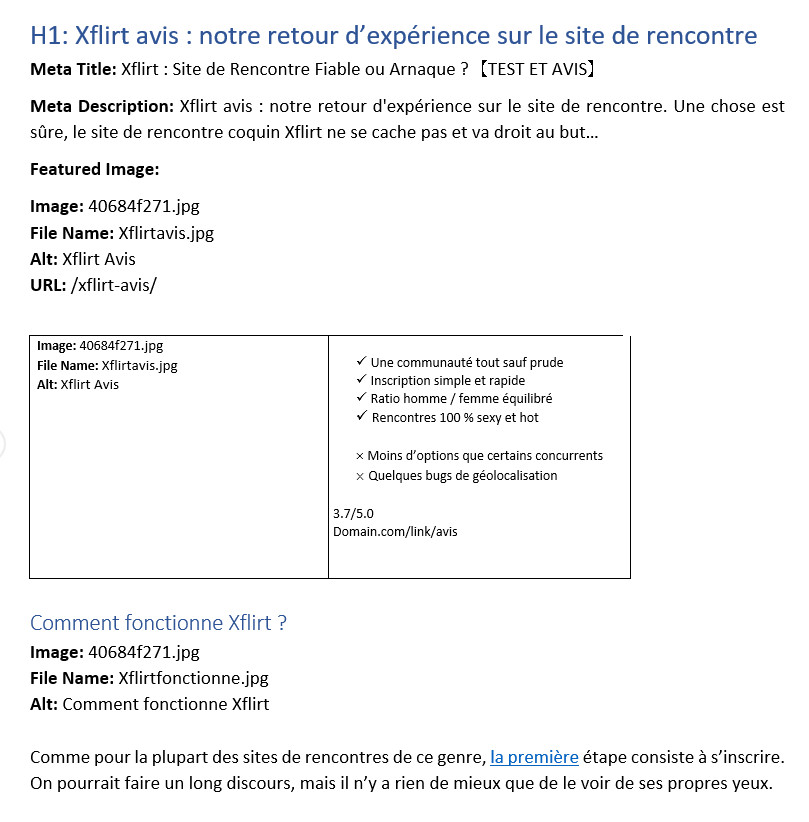
Off-Site SEO
As I mentioned before, choosing an aged domain has the benefit of carrying a strong backlink profile to begin with, so if you’ve gone down this route, you don’t need to buy as many links to start with.
If you don’t speak the target language, backlink outreach is typically harder. You can get your content writer to write some typical emails and follow-ups for you, but often, generic responses aren’t suitable.
Let’s say you spend the time to setup your outreach system with templates and you get a response that says “あなたのウェブサイトは犬の糞のように見えます”. Now what? You’ll need to hire a foreign language speaker just for managing this.
So, until you decide it is time to expand and hire an outreach manager, in my experience, it is easier to buy links. I typically use Authority Builders because they have a huge inventory of high authority foreign sites. Here are the metrics of the ones I bought for this project:
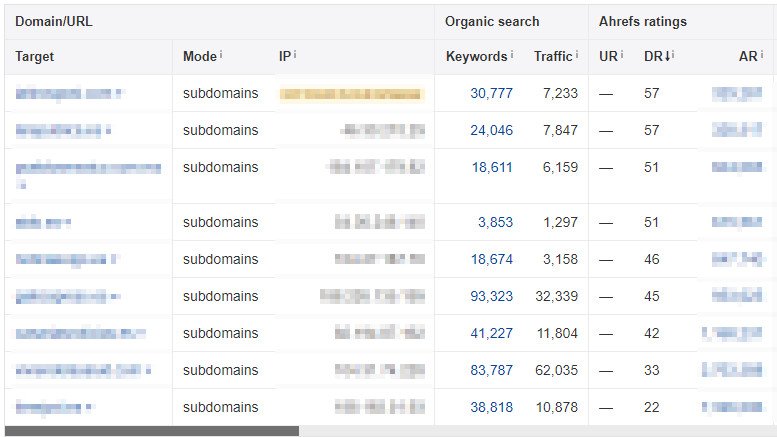
Authority Builders can help with foreign link building in languages including:
- German
- Spanish
- French
- Italian
- Swedish
- Dutch
- Polish
- Portuguese
- and more
If you have a specific language, it’s best to contact them to find out the options available.
Just as you would for your English-speaking websites, you should research your competitors’ backlinks and anchor texts. Typically, you can afford to be much more aggressive than you would do normally when choosing anchor texts.
In order to gain more local relevance and make your backlink profile look more natural, we recommend buying location-specific citation links.
Scaling & Automation
Automating your processes is critical, because you ultimately don’t want to be integral to the operation, and you want to be able to scale the website.
Using a project management tool, like Trello or Click Up, is key for automation. Ultimately, by creating good systems, you will be able to build a solid team and therefore create more websites with less involvement.

Once your site is ranking and is bringing in regular commissions, it is time to think about scaling, and if you haven’t already, it is worth hiring an SEO who can speak the language.
They can take over managing the content, optimising metas, and you can get them to do more in-depth competitor analysis.
With a solid team established, your website will accelerate faster and you can step back from a managerial position into an investor’s role. You can then put the time into researching other niches within that language, which your team can then expand into, using the same systems, creating more websites for you.
Conclusion
Using the processes outlined in this article, we took our foreign SEO site from 0 to over 37k monthly visitors in a high buyer intent supplement niche in just nine months, and it continues to improve:

We are continually developing our foreign language SEO team and expanding into new countries. We are looking to hire SEO project managers which are fluent in other languages. If you would like to apply, please fill out this form.
Now you can see how easy it is to get started in foreign language SEO, you can start to take the next steps in diversifying your portfolio of websites. Building the systems is easier than you think, the competition is lower, and the rewards are high.
Got Questions or Comments?
Join the discussion here on Facebook.
